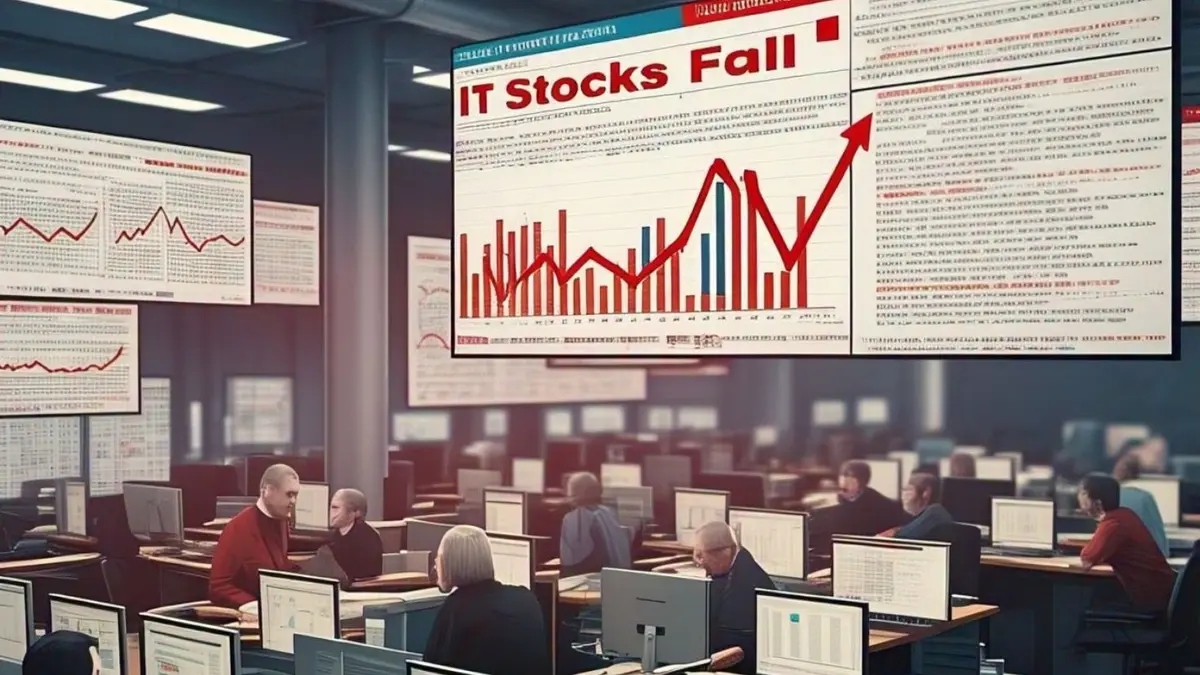Updated April 7th 2025, 10:51 IST
Indian IT Stocks Tumble Up to 7% Amid US Recession Fears
Investors are now closely monitoring macroeconomic indicators and corporate feedback before recalibrating their bets in the IT space.

Indian IT shares plummeted sharply on April 7, 2025, as investor mood became bearish due to rising concerns of a recession in the US and new tariffs announced by the Trump administration.
On 7 April 2025, the Nifty IT index had a steep fall in the midst of growing anxiety over a recession in the U.S. and continued trade tensions. The index opened at 31,500.00 against the previous close of 33,511.40, representing a fall of about 6%
The wider Nifty IT index also fell 7.5% to 31,002.05, indicating sector-wide pressure.
Market Impact on Indian IT Stocks
The Nifty IT index fell around 7.5 to a 52-week low of 31,002.05, with blue-chip companies like Tata Consultancy Services (TCS), Infosys, HCL Technologies, and Coforge having their share prices decline by as much as 6%.
Blue-chip companies like Coforge fell by 9.50% to ₹5,980, while HCL Technologies fell 7.04% to ₹1,321.95. Other blue-chip IT companies like Infosys fell 5.28%, L&T Technology Services fell 6.24%, and LTIMindtree fell 4.30%.
Factors Contributing To Decline
The decline is mainly due to fear of a possible U.S. recession, compounded by recent tariff actions. These tariffs have raised the specter of an economic slowdown in the U.S., a major market for Indian IT exports. Analysts say this could result in lower client expenditures, slower deal cycles, and postponed projects for Indian IT companies.
Analyst Views
Financial experts have been wary of the Indian IT companies' prospects. Economists at JPMorgan predict the tariffs could shrink U.S. GDP by 0.3% this year and increase unemployment. KPMG downgraded the UK's economic growth forecasts to 0.8% for 2025 and 2026, citing the adverse effects of U.S. tariffs.
Fear of a U.S. recession has also extended to wider Indian equity markets. Both the Nifty 50 and BSE Sensex have fallen sharply, demonstrating increased investor unease.
What's Next
Since more than half of India's $190 billion software exports are going to the U.S., the Indian IT industry is extremely susceptible to the economic changes in that market. The analysts project conservative revenue projections, particularly for discretionary spend-dependent companies, with the impact expected to become larger by the September quarter.
Investors are now closely monitoring macroeconomic indicators and corporate feedback before recalibrating their bets in the IT space.
Overall, the interplay between U.S. recession worries and fresh tariff rollouts has seen Indian IT shares decline appreciably.
Future performance of the shares will predominantly be driven by how the world economic landscape develops and how it affects client outlays and project pipelines.
Published April 7th 2025, 10:51 IST
